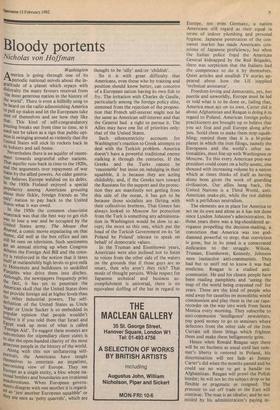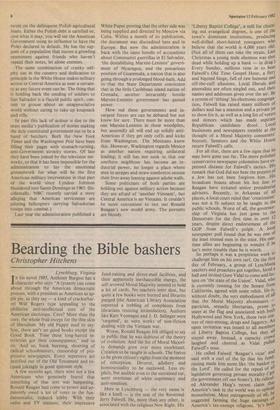Bloody portents
Nicholas von Hoffman
America is going through one of its periodic national snivels about the in- gratitude of a planet which repays with disloyalty the many favours received from the most generous nation in the history of the world'. There is even a hillbilly song to be heard on the radio admonishing America to Pull up stakes and let the Europeans take Care of themselves and see how they like that. This kind of self-congratulatory Pouting breaks out from time to time, so it need not be taken as a sign that public opi- nion is swinging around so violently that the United States will stick its rockets back in its holsters and sail home.
Nevertheless there is an aquifer of resent- ment towards ungrateful other nations. That aquifer runs back in time to the 1920s, and the arguments over repayment of war loans by the allied powers. An older genera- tion believes Europe welshed on its debts. In the 1930s Finland enjoyed a special popularity among Americans grousing about their fickle, foreign friends as 'the 2111Y' nation to pay back to the United States what it was owed.
In the 1950s the common chauvinist Wisecrack was that the best way to get rich Was to lose a war and be occupied by the United States army. The Mouse that Roared, a comic movie expatiating on that theme, did well at the box office and can still be seen on television. Such sentiments get an annual stirring up when Congress debates the Foreign Aid Bill and the coun- try is reinforced in the notion that it taxes itself at outlandishly high levels to give milk to Hottentots and bulldozers to unskilled Punjabis who drive them into ditches. Although, the newspapers frequently print the fact, it has yet to penetrate the American skull that the United States does not provide foreign aid at higher levels than the other industrial powers. The self- definition of the United States as Uncle Sugar or Uncle Sucker is so embedded in popular opinion that people wouldn't believe it if you told them that Israel and Egypt soak up most of what is called Foreign Aid'. To suggest these moneys are subventions for stipendiary client states is to slur the open-handed charity of the most generous people in the history of the world. Along with this not unflattering self- Portrait, the Americans have taught themselves to entertain an impatient, Patronising view of Europe. They see '..tirope as a single entity, a bloc whose na- tional borders and boundaries are irrational anachronisms. When European govern- ihents disagree with one another it is regard- ed as 'just another European squabble' or they are seen as 'petty quarrels', which are
thought to be 'silly' and/or 'childish'.
So it is with great difficulty that Americans, even those who by training and position should know better, can conceive of a European nation having its own fish to fry. The irritation with Charles de Gaulle, particularly among the foreign policy elite, stemmed from the rejection of the proposi- tion that French self-interest might not be the same as American self-interest and that the General had a right to pursue it. The Allies may have one list of priorities only: that of the United States.
Such ethnocentricity accounts for Washington's reaction to Greek attempts to deal with the Turkish problem. America doesn't have a powerful traditional enemy stalking it through the centuries. If the Greeks and the Turks cannot be 'reasonable' but insist on indulging in their squabble, it is because they are acting childishly; and, if the Greeks turn toward the Russians for the support and the protec- tion they are manifestly not getting from this side of the ocean, it has got to be because those socialists are flirting with their collectivist brethren. That Greece has always looked to Moscow for protection from the Turk is something any administra- tion in Washington would be slow to ac- cept; the more so this one, which put the head of the Turkish Government on its 'let Poland be Poland' telecast to speak on behalf of democratic values.
In the Truman and Eisenhower years, Americans were also inclined not to listen to voices from the other side of the waters on the grounds that if those guys are so smart, then why aren't they rich? That mode of thought persists. While respect for Japanese technical and business ac- complishment is universal, there is no equivalent doffing of the hat in regard to Europe, not even Germany, a nation Americans still regard as their equal in terms of indoor plumbing and personal hygiene. Japanese penetration of the con- sumer market has made Americans con- scious of Japanese proficiency, but when the Italian police freed the American General kidnapped by the Red Brigades, there was scepticism that the Italians had the competence to do it by themselves. Quiet articles and smallish TV stories ap- peared about how the US Supplied 'technical assistance'.
Freedom-loving and democratic, yes, but puerile and unworldly, Europe must be led or told what is to be done or, failing that, America must act on its own. Carter did it about Afghanistan and Reagan is doing it in regard to Poland. American foreign policy practitioners are brought up to believe that you act first and pull Europe along after you. Scold them to make them stop squab- bling; remind them that it is a bi-polar planet in which the iron filings, namely the Europeans and the world's other na- tionalities, must line up with Washington or Moscow. To this every American post-war president could count on a hefty assent, one shouted with increasing volume by a nation which at times thinks of itself as having alone been given the work of guarding civilisation. Our allies hang back, the United Nations is a Third World, anti- American snake-pit, while the rest dabble with a perfidious neutralism.
The elements are in place for America to act on its own and alone as it has not done since Lyndon Johnson's administration. In those years there was a big-shouldered ar- rogance propelling the decision-making, a conviction that America was too god- damned powerful to stop; that conviction is gone, but in its stead is a consecrated dedication to the struggle. Wilson, Truman, Eisenhower, Kennedy, Johnson were instinctive anti-communists. They had but to sniff red to know it was bad medicine. Reagan is a studied anti- communist. He and his closest people have been reading pamphlets and 'seeing the map of the world being crayoned red' for years. These are the kind of people who send away for cassettes on monolithic world communism and play them in the car tape- recorder on the way into work from Santa Monica every morning. They subscribe to anti-communist 'intelligence' newsletters, pay good money to go to seminars where defectors from the other side of the Iron Curtain tell them things which frighten them and make them belligerently grim.
Hence when Ronald Reagan says there will be no business as usual until last sum- mer's liberty is restored in Poland, his determination will not fade as Jimmy Carter's did when the months passed and he could see no way to get a handle on Afghanistan. Reagan will prowl the Polish border; he will not let the subject drop or be flexible or pragmatic or resigned. The pressure to cut off trade to the East will continue. The man is an idealist; and be not misled by his administration's paying in- terest on the delinquent Polish agricultural loans. Either the Polish debt is satisfied or, cost what it may, you will see the American Government using its influence to have the Poles declared in default. He has the sup- port of a population that nurses a growling resentment against friends who haven't repaid their notes, let alone enemies.
The same combination of cranky self- pity out in the country and dedication to principle in the White House makes military action in Central America as near a certain- ty as any future event can be. The thing that is holding back the sending of soldiers to San Salvador is a flaccid public spirit, con- tent to grouse about an unappreciative world without caring to take up knapsack and rifle.
In part this lack of ardour is due to the mass media's publication of stories making the duly constituted government out to be a band of butchers. Both the New York Times and the Washington Post have been Filling their pages with stomach-turning, anti-Government atrocity stories. Of late they have been joined by the television net- works, so that it has been impossible for the administration to lay the emotional groundwork for what will be the first American military intervention in that part of the world since Lyndon Johnson blundered into Santo Domingo in 1965. (In- cidentally, NBC recently carried a story alleging that American servicemen are piloting helicopters carrying Salvadorian troops into combat.)
Last year the administration published a White Paper proving that the other side was being supplied and directed by Moscow via Cuba. Within a month of its publication, the document was discredited here and in Europe. But now the administration is back with the same bundle of accusations about Communist guerrillas in El Salvador, 'the destabilising Marxist-Leninist' govern- ment of Nicaragua, and the precarious position of Guatemala, a nation that is also going through a prolonged blood-bath. Add to that the State Department conviction that in the little Caribbean island nation of Grenada, another intractably hostile Marxist-Leninist government has gained power.
How red these governments and in- surgent forces are can be debated but not know for sure. There must be more than one Marxist-Leninist in those woodpiles, but assuredly all will end up solidly anti- American if they get only cuffs and kicks from Washington. The Mexicans know this. However, Washington regards Mexico as another nation requiring unilateral leading; it still has not sunk in that our southern neighbour has become an in- dustrial power, no longer a place where men in serapes and straw sombreros snooze their lives away leaning against adobe walls.
Some politicians of both parties are holding out against military action because they are afraid of 'another Vietnam', but Central America is no Vietnam. It couldn't be more convenient to test out Ronald Reagan 's new mode] army. The portents are bloody.











































 Previous page
Previous page